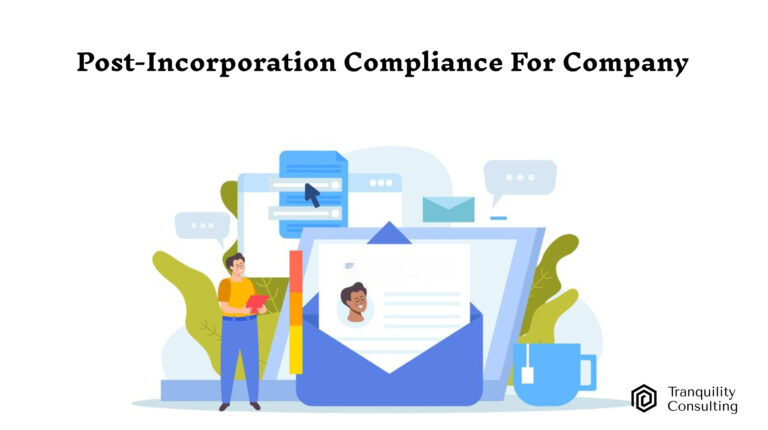Incorporating a company is a significant milestone, but it’s just the beginning. Post-incorporation compliance ensures that your business operates within the law and avoids penalties. This guide will explore the critical post-incorporation compliance requirements that every company must follow. By adhering to these guidelines, your company can maintain its good standing and focus on growth.
Why Is Post-Incorporation Compliance Important?
When incorporated, a company becomes a distinct legal entity with rights and obligations under the law. Post-incorporation compliance ensures businesses adhere to the legal and regulatory framework established by their jurisdiction. Failing to meet these requirements can have serious repercussions, including fines, loss of liability protection, and, in severe cases, dissolution of the company. Maintaining compliance protects your business and fosters trust among stakeholders, such as investors, employees, and customers.
1. Understanding Post-Incorporation Compliance
After incorporation, businesses must complete several legal and administrative tasks to stay compliant. These obligations vary based on your company’s structure (LLC, corporation, etc.) and jurisdiction. Ignoring these tasks can lead to fines, loss of good standing, or even dissolution of the company.
2. Key Post-Incorporation Compliance Tasks
- Filing Annual Reports
Many states require companies to file annual reports that include basic company information, such as addresses and officer names. Failure to meet deadlines can result in penalties. - Maintaining a Registered Agent
Every business must designate a registered agent to receive legal and tax documents. Ensure that your registered agent details are updated regularly.
- Obtaining Necessary Licenses and Permits
Some industries require additional licenses or permits to operate legally. Research your local and federal requirements to stay compliant. - Keeping Corporate Records
Maintaining accurate records, such as meeting minutes, bylaws, and shareholder agreements, is essential for corporations. - Paying Taxes
Ensure compliance with federal, state, and local tax obligations. This includes filing corporate income tax returns and paying payroll taxes if applicable.
3. Importance of Compliance for Business Success
Compliance is a cornerstone of business success, extending beyond the avoidance of penalties to become a critical factor in building trust, credibility, and growth. By adhering to legal and regulatory requirements, companies signal their commitment to ethical practices and operational transparency, which fosters trust with investors, clients, and partners. A compliant business appears more organized and reliable, enhancing its reputation and paving the way for investment opportunities, stronger partnerships, and increased customer confidence. Compliance also facilitates expansion into new markets, secures eligibility for government contracts, and reduces legal risks by ensuring adherence to labor, tax, and industry-specific laws.
4. Post-Incorporation Compliance Checklist
Here’s a quick checklist to help you stay on track:
- File your annual report with the state.
- Pay all applicable taxes on time.
- Renew business licenses and permits as needed.
- Keep corporate records organized and accessible.
- Maintain updated information with your registered agent.
5. Common Mistakes to Avoid in Post-Incorporation Compliance
- Missing Filing Deadlines: Ensure you know your state’s filing deadlines to avoid penalties.
- Ignoring License Renewals: Keep track of all permits and licenses to avoid legal issues.
- Inadequate Record-Keeping: Always maintain organized and up-to-date corporate records.
- Failing to Update Registered Agent Information: Promptly inform the state about any changes.
6. Compliance Tips for New Companies
- Use a compliance calendar to track deadlines.
- Invest in software for record-keeping and tax filings.
- Work with a compliance expert or consultant for guidance.
Conclusion:
Post-incorporation compliance is a continuous process that ensures your company operates within the legal framework. By understanding and meeting these obligations, you protect your business from penalties and foster trust with stakeholders. Partnering with experts like Tranquility Consulting can simplify the process, letting you focus on what you do best—growing your business.
FAQs:
- What is post-incorporation compliance?
Post-incorporation compliance involves a business’s ongoing tasks after incorporation, such as filing reports, paying taxes, and maintaining records. - Why is maintaining a registered agent important?
A registered agent ensures your business receives legal and tax documents promptly and complies with state requirements. - What happens if I miss filing my annual report?
Failure to meet filing deadlines for annual reports can result in penalties, loss of good standing, or even the dissolution of your company. - How can I stay compliant with tax regulations?
To stay tax-compliant, file your corporate income tax returns on time, pay payroll taxes, and adhere to federal, state, and local tax laws. - How does Tranquility Consulting assist with compliance?
Tranquility Consulting offers services like registered agent management, annual report filing, and compliance tracking to help businesses maintain good standing.
If you have any questions or need business-related tax consulting advice, please get in touch with us at: [email protected]





